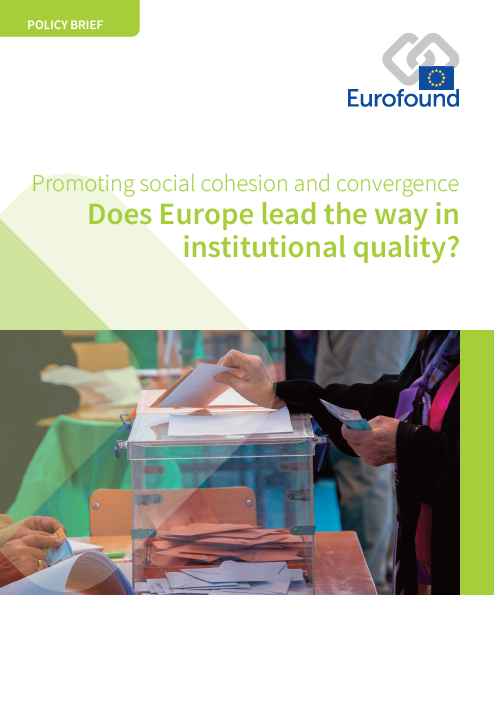
The quality of institutions is a key factor in achieving upward economic and social convergence in the EU, playing a fundamental role in growing the economy, attracting foreign investment, ensuring the implementation of policies and reforms, and successfully accessing EU funds. The fitness for purpose of public institutions is particularly relevant at present with the implementation of the NextGenerationEU programme, as poor institutional quality could prevent access to funds and undermine the effectiveness of the programme itself. This policy brief presents the results of an investigation into upward convergence in the EU in respect of the six Worldwide Governance Indicators developed by the World Bank. While the results show that Europe remains at the forefront of global institutional quality, there has been a deterioration since the 2008 financial crisis. Action is needed in the area of public governance to reverse this trend.
Key findings
High-quality institutional performance is associated with higher gross domestic product (GDP) per capita, higher employment rates and higher trust in national government. It is also associated with lower risk of poverty and social exclusion, highlighting how high-performing institutions are essential to lasting economic and social convergence in the EU.
Although the EU27 Member States are leaders in institutional quality globally according to the six Worldwide Governance Indicators (WGIs), their performance deteriorated on all the indicators after the 2008 crisis. This trend is particularly worrying given the important role of institutions in strengthening the resilience of societies and in accessing EU funds that contribute to this process.
The Nordic and western European Member States emerge as the best performers on institutional quality in Europe over 1996–2020, while the performance of the Baltic states has improved remarkably since joining the EU, overtaking the Mediterranean Member States, whose scores have declined in the past 12 years. The performance of the central and eastern European Member States has been stable; however, despite some improvements, Bulgaria and Romania had the poorest institutional quality over the period.
While emergency mechanisms and EU funds are important recovery tools, a more long-term focus is also required at EU level to ensure lasting upward convergence in institutional quality. The inclusion of institutional quality as an aim of the NextGenerationEU is an important opportunity to reinforce administrative capacity and enhance the quality of governance so that Member States can address present and future adverse economic and social shocks more effectively.
Previous research has found that higher institutional quality and stronger administrative capacity can help drive the absorption rate of EU funds as well as maximising their growth-enhancing effects for Member States and regions. This underlines how improving institutional quality is not only an incentive for growth overall, but also a key requirement for the effective management and access to the NextGenerationEU funds.
The policy brief contains the following lists of tables and figures.
List of tables
Table 1: Summary of convergence analysis of WGIs over 1996–2020, 1996–2008 and 2008–2020
Table 2: Correlation of the WGIs and selected socioeconomic indicators
List of figures
Figure 1: EU performance on WGIs compared with global averages, 2020
Figure 2: Clustering of countries according to the WGIs
Figure 3: Trends in the WGIs across six European country groups
Figure 4: Downward convergence in the Voice and accountability indicator, 1996–2020
Figure 5: Downward convergence in the Political stability indicator, 1996–2020
Figure 6: Downward convergence in the Government effectiveness indicator, 1996–2020
Figure 7: Upward convergence in the Regulatory quality indicator, 1996–2020
Figure 8: Upward convergence in the Rule of law indicator, 1996–2020
Figure 9: Upward convergence in the Control of corruption indicator, 1996–2020
- Number of pages
-
28
- Reference nº
-
EF22026
- ISBN
-
978-92-897-2288-9
- Catalogue nº
-
TJ-AR-22-002-EN-N
- DOI
-
10.2806/512588
- Permalink
Cite this publication
Eurofound (2022), Does Europe lead the way in institutional quality? Publications Office of the European Union, Luxembourg.